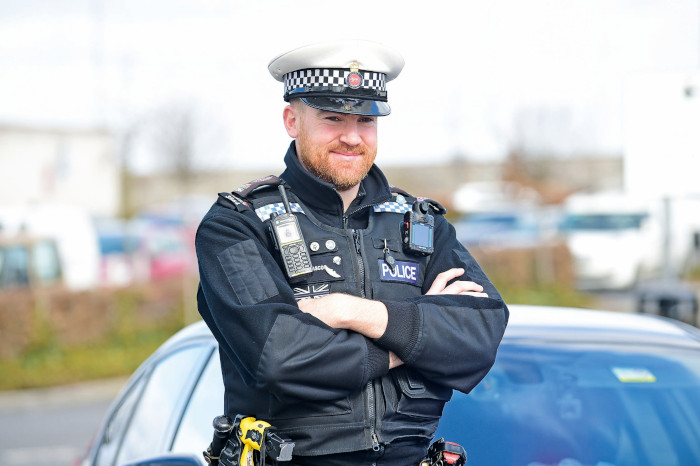National Highways has marked the 10th anniversary since its first unmarked HGV cab went out on patrol with the police to trial new ways to deter unsafe driving, and Operation Tramline was born.
Some 13,000 hours have been racked up by the police under the road safety operation since officers from Surrey took out the first HGV in 2015. Over that time, more than 51,500 offences have been recorded from 35 different police forces.
To mark the safety campaign’s 10th anniversary, National Highways has detailed some of the shocking incidents captured over the years. These include:
- People eating takeaways, a driver scoffing a bowl of cereal at the wheel in North Yorkshire and someone tucking into lasagne with a knife and fork while driving.
- A woman driver applying her makeup while travelling along the M40 in the Midlands.
- A driver steering a vehicle transporter with just his elbows along the M40 in Warwickshire.
- Drivers using two mobile phones at a time, as well as one driver who was placing an online order with a phone in one hand and holding their credit card in the other.
- A driver playing with a Rubik’s Cube while manoeuvring through M25 traffic.
- Hampshire Police once saw three HGV drivers from the same company using their phones while driving during a week of activity.
- A driver in Surrey defended their use of a mobile phone while driving saying that they had a new girlfriend and that their song came on the radio, so they needed to call them.
National Highways said the most common offences recorded over the last decade were not wearing a seatbelt (14,861) and using a mobile phone (13,553). Taken together these offences made up over half (54%) of the total number of offences recorded between 2015 and 2024.
Department for Transport road casualty statistics from 2018 to 2022 show that 24% of car occupant fatalities were not wearing a seatbelt. Motorists are also four times more likely to be in a crash if using a mobile phone while driving.
Roads minister, Lilian Greenwood, said: ‘Dangerous driving puts everyone on our roads in danger, and Operation Tramline plays a vital role in tackling this issue.
'While our roads are among the safest in the world, we are committed to improving road safety, and our recent Click! THINK! campaign, which specifically targets young men, reminds drivers and passengers to wear their seatbelts at all times.’
National Highways director of road safety, Sheena Hague, said: ‘Our goal through Operation Tramline has always been to remind motorists to think carefully about their driving behaviours behind the wheel. The choices people make can have such a devastating and far reaching impact on people’s lives.’
On the frontline
Sgt Dan Pascoe (pictured) was one of the first officers to go out in the Operation Tramline HGV in March 2015. At the time he was just a young PC, now he is in charge of the operation for Surrey Police and Sussex Police, working in the Vanguard Road Safety Team for Surrey's force.
‘I was working in the roads policing team and volunteered to go out in the Operation Tramline HGV, and I have been involved ever since. The truck gives us an invaluable observation point. Vehicles have been getting progressively higher over the years, but this cab is a golden ticket enabling us to see over into pretty much every vehicle,’ he said.
Sgt Pascoe argued the campaign has helped reduce motorway mobile phone use following its initial focus on this offence, which has since been broadened to all offences.
‘We have definitely seen a significant tail-off. We may never have a zero month unfortunately, but the message is certainly getting through.’
Sgt Pascoe concluded: 'I believe we are making a difference with Operation Tramline. You are four more times more likely to die in a crash if you are on your phone, so for every 100 distracted drivers we have stopped we could have prevented 25 collisions.’
There are now three unmarked HGVs available to police partners who can take advantage of the elevated position to see into cars and vans or across into lorries.






